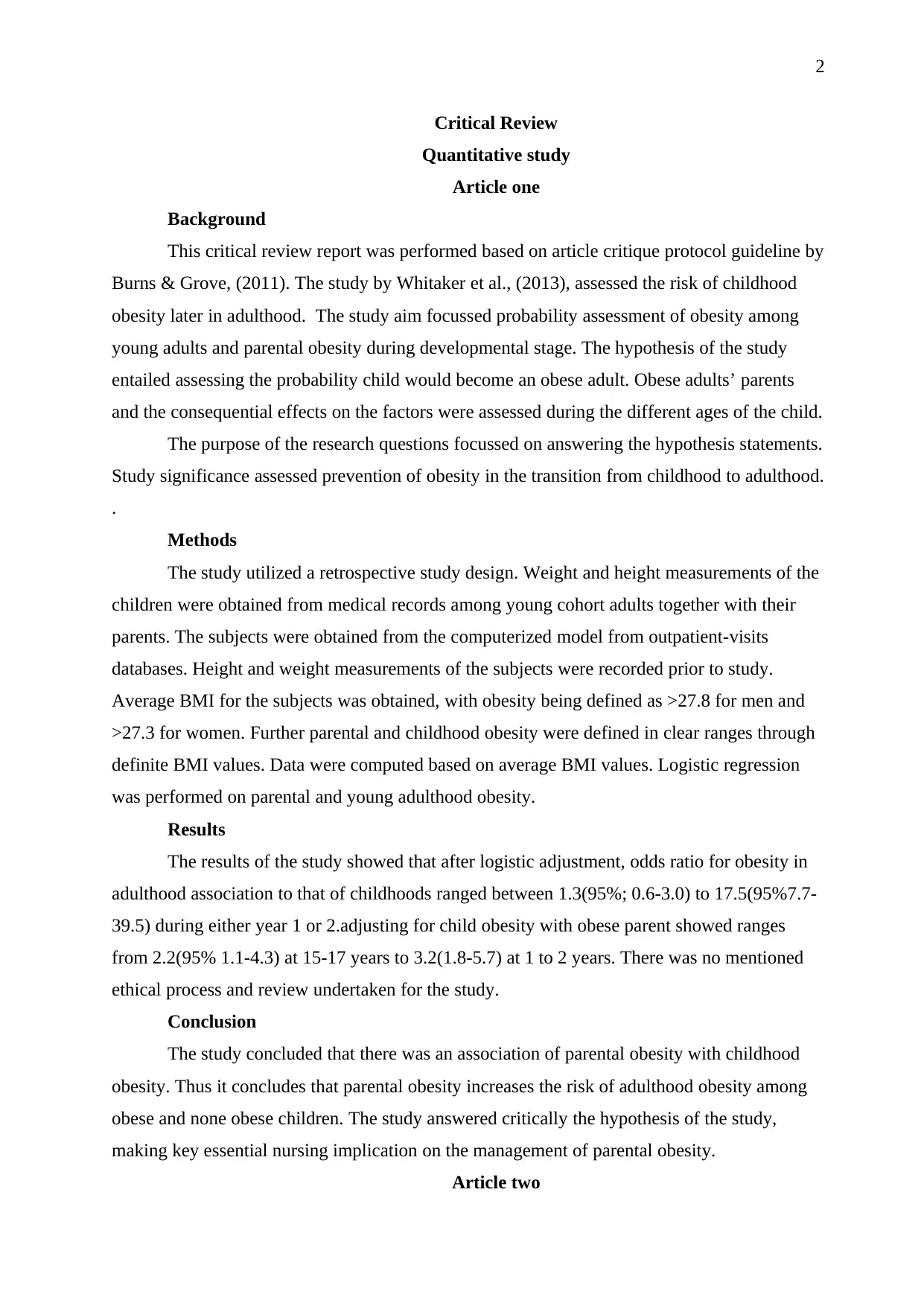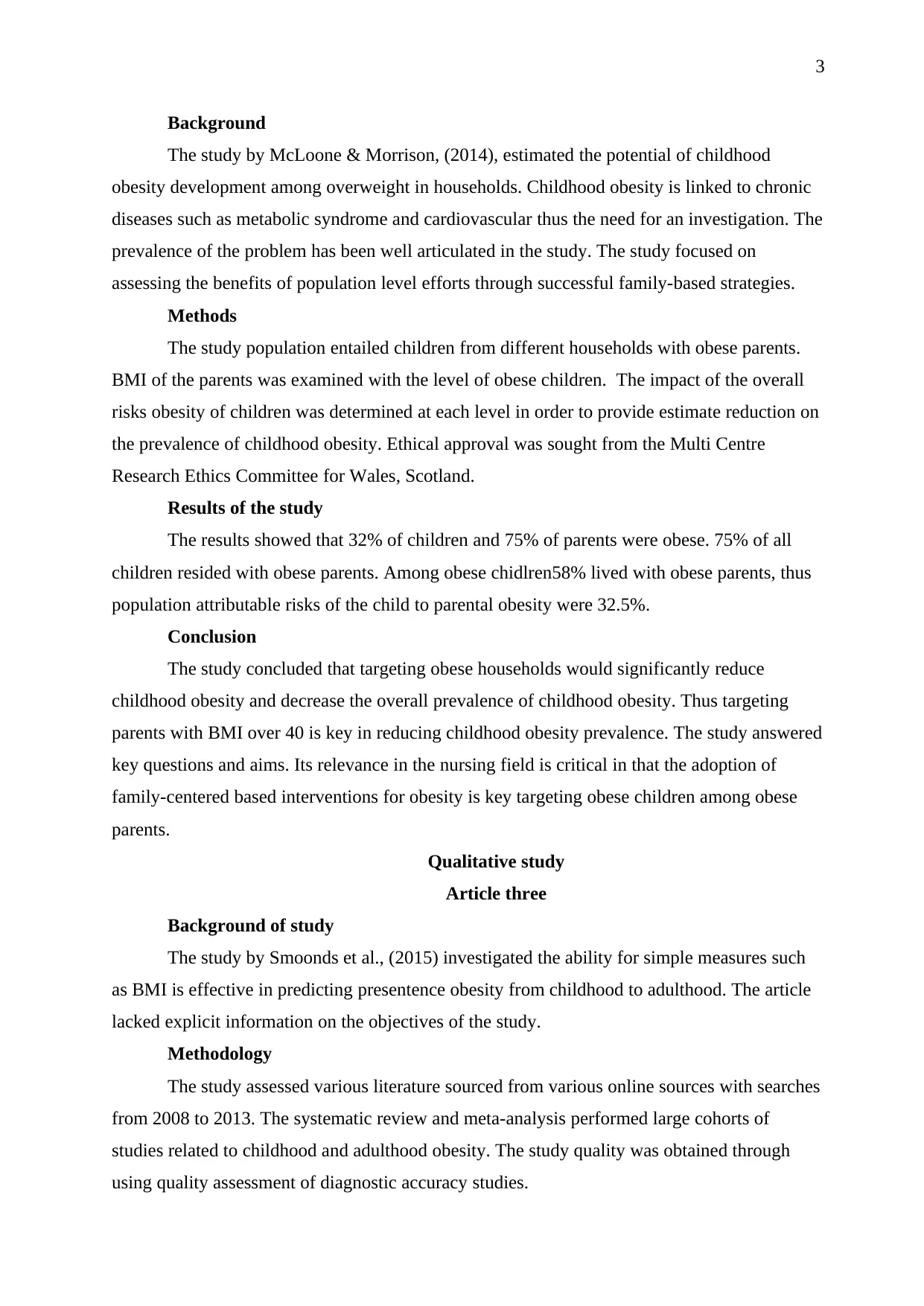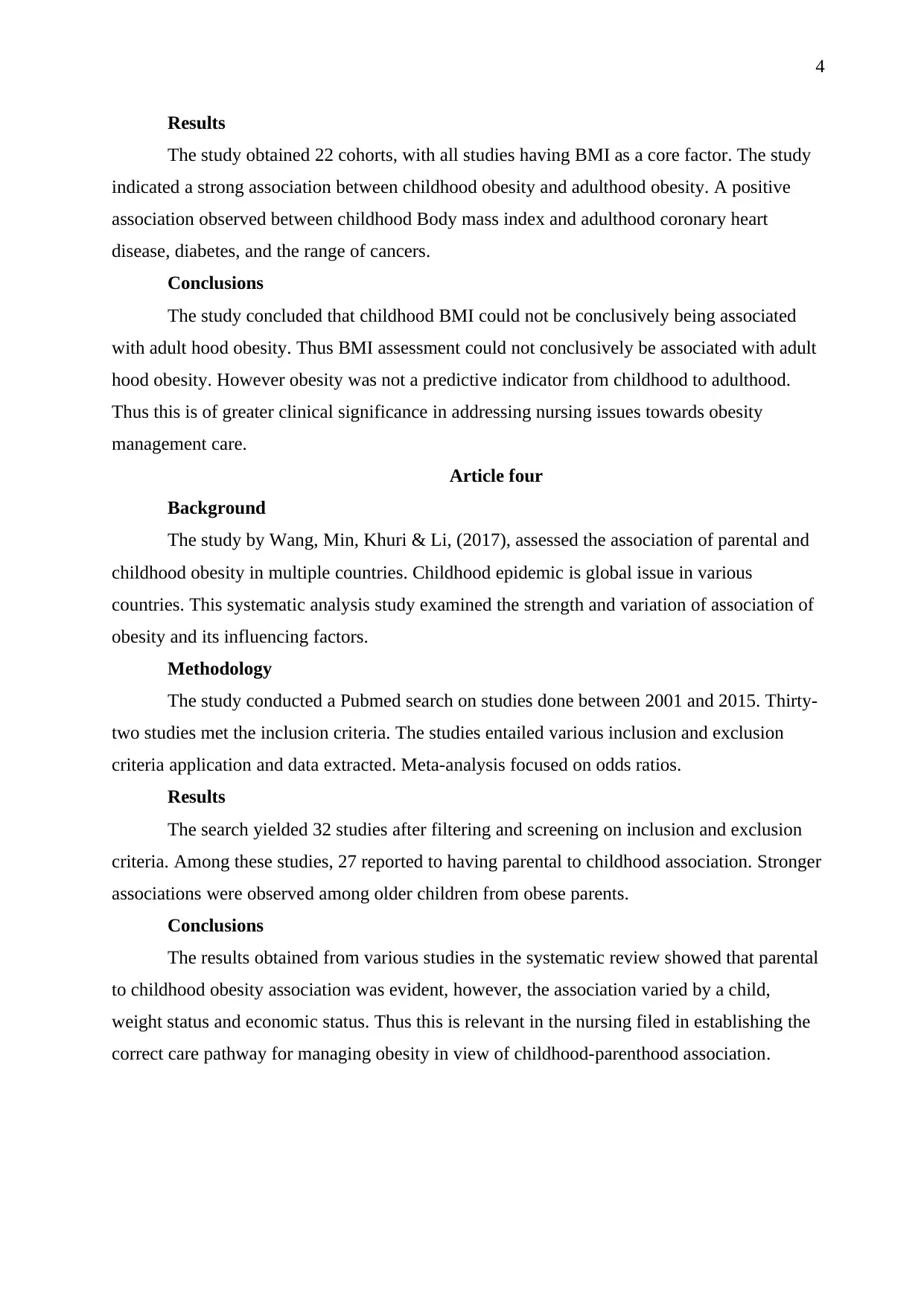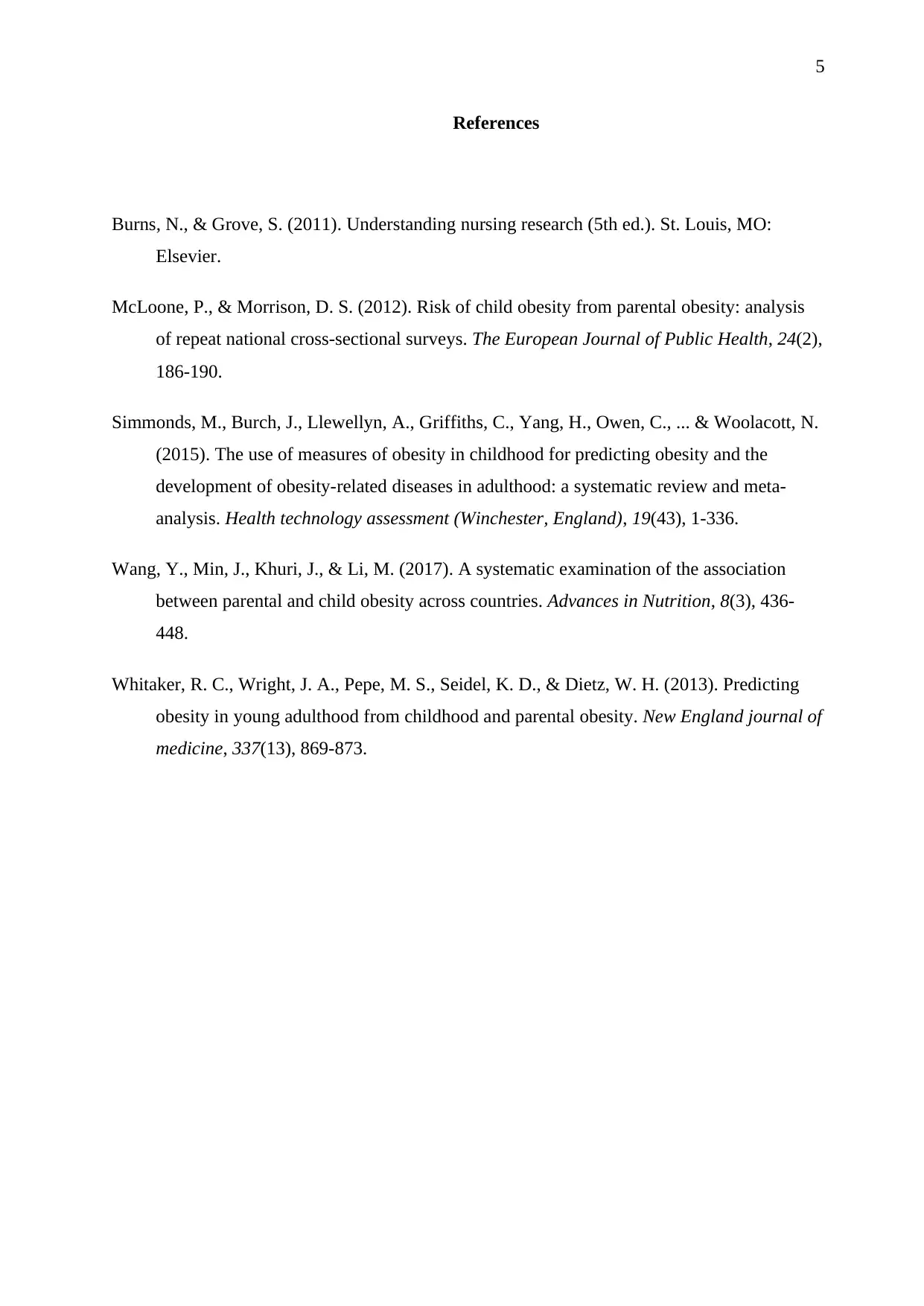Critical Review: A Study of Childhood and Parental Obesity Association
VerifiedAdded on 2023/04/06
|5
|1113
|299
Literature Review
AI Summary
This assignment presents a critical review of four articles focusing on the association between childhood and parental obesity. The first study assesses the risk of childhood obesity in adulthood, finding a strong correlation between parental obesity and the likelihood of obesity in children. The second study estimates the potential impact of targeting obese households to reduce childhood obesity prevalence, concluding that interventions focused on families with obese parents are key. The third study investigates the effectiveness of BMI as a predictor of adulthood obesity from childhood, suggesting that childhood BMI alone may not be a conclusive indicator. The fourth study examines the association of parental and childhood obesity across multiple countries, revealing that while a parental-childhood obesity association is evident, it varies by child's age, weight status, and economic status. The review highlights the importance of addressing parental obesity to mitigate the risk of childhood obesity and emphasizes the need for tailored interventions based on individual and familial circumstances. Desklib offers more solved assignments and study resources for students.

Critical Review
University
Unit
Tutor
Date
University
Unit
Tutor
Date
Paraphrase This Document
Need a fresh take? Get an instant paraphrase of this document with our AI Paraphraser

2
Critical Review
Quantitative study
Article one
Background
This critical review report was performed based on article critique protocol guideline by
Burns & Grove, (2011). The study by Whitaker et al., (2013), assessed the risk of childhood
obesity later in adulthood. The study aim focussed probability assessment of obesity among
young adults and parental obesity during developmental stage. The hypothesis of the study
entailed assessing the probability child would become an obese adult. Obese adults’ parents
and the consequential effects on the factors were assessed during the different ages of the child.
The purpose of the research questions focussed on answering the hypothesis statements.
Study significance assessed prevention of obesity in the transition from childhood to adulthood.
.
Methods
The study utilized a retrospective study design. Weight and height measurements of the
children were obtained from medical records among young cohort adults together with their
parents. The subjects were obtained from the computerized model from outpatient-visits
databases. Height and weight measurements of the subjects were recorded prior to study.
Average BMI for the subjects was obtained, with obesity being defined as >27.8 for men and
>27.3 for women. Further parental and childhood obesity were defined in clear ranges through
definite BMI values. Data were computed based on average BMI values. Logistic regression
was performed on parental and young adulthood obesity.
Results
The results of the study showed that after logistic adjustment, odds ratio for obesity in
adulthood association to that of childhoods ranged between 1.3(95%; 0.6-3.0) to 17.5(95%7.7-
39.5) during either year 1 or 2.adjusting for child obesity with obese parent showed ranges
from 2.2(95% 1.1-4.3) at 15-17 years to 3.2(1.8-5.7) at 1 to 2 years. There was no mentioned
ethical process and review undertaken for the study.
Conclusion
The study concluded that there was an association of parental obesity with childhood
obesity. Thus it concludes that parental obesity increases the risk of adulthood obesity among
obese and none obese children. The study answered critically the hypothesis of the study,
making key essential nursing implication on the management of parental obesity.
Article two
Critical Review
Quantitative study
Article one
Background
This critical review report was performed based on article critique protocol guideline by
Burns & Grove, (2011). The study by Whitaker et al., (2013), assessed the risk of childhood
obesity later in adulthood. The study aim focussed probability assessment of obesity among
young adults and parental obesity during developmental stage. The hypothesis of the study
entailed assessing the probability child would become an obese adult. Obese adults’ parents
and the consequential effects on the factors were assessed during the different ages of the child.
The purpose of the research questions focussed on answering the hypothesis statements.
Study significance assessed prevention of obesity in the transition from childhood to adulthood.
.
Methods
The study utilized a retrospective study design. Weight and height measurements of the
children were obtained from medical records among young cohort adults together with their
parents. The subjects were obtained from the computerized model from outpatient-visits
databases. Height and weight measurements of the subjects were recorded prior to study.
Average BMI for the subjects was obtained, with obesity being defined as >27.8 for men and
>27.3 for women. Further parental and childhood obesity were defined in clear ranges through
definite BMI values. Data were computed based on average BMI values. Logistic regression
was performed on parental and young adulthood obesity.
Results
The results of the study showed that after logistic adjustment, odds ratio for obesity in
adulthood association to that of childhoods ranged between 1.3(95%; 0.6-3.0) to 17.5(95%7.7-
39.5) during either year 1 or 2.adjusting for child obesity with obese parent showed ranges
from 2.2(95% 1.1-4.3) at 15-17 years to 3.2(1.8-5.7) at 1 to 2 years. There was no mentioned
ethical process and review undertaken for the study.
Conclusion
The study concluded that there was an association of parental obesity with childhood
obesity. Thus it concludes that parental obesity increases the risk of adulthood obesity among
obese and none obese children. The study answered critically the hypothesis of the study,
making key essential nursing implication on the management of parental obesity.
Article two

3
Background
The study by McLoone & Morrison, (2014), estimated the potential of childhood
obesity development among overweight in households. Childhood obesity is linked to chronic
diseases such as metabolic syndrome and cardiovascular thus the need for an investigation. The
prevalence of the problem has been well articulated in the study. The study focused on
assessing the benefits of population level efforts through successful family-based strategies.
Methods
The study population entailed children from different households with obese parents.
BMI of the parents was examined with the level of obese children. The impact of the overall
risks obesity of children was determined at each level in order to provide estimate reduction on
the prevalence of childhood obesity. Ethical approval was sought from the Multi Centre
Research Ethics Committee for Wales, Scotland.
Results of the study
The results showed that 32% of children and 75% of parents were obese. 75% of all
children resided with obese parents. Among obese chidlren58% lived with obese parents, thus
population attributable risks of the child to parental obesity were 32.5%.
Conclusion
The study concluded that targeting obese households would significantly reduce
childhood obesity and decrease the overall prevalence of childhood obesity. Thus targeting
parents with BMI over 40 is key in reducing childhood obesity prevalence. The study answered
key questions and aims. Its relevance in the nursing field is critical in that the adoption of
family-centered based interventions for obesity is key targeting obese children among obese
parents.
Qualitative study
Article three
Background of study
The study by Smoonds et al., (2015) investigated the ability for simple measures such
as BMI is effective in predicting presentence obesity from childhood to adulthood. The article
lacked explicit information on the objectives of the study.
Methodology
The study assessed various literature sourced from various online sources with searches
from 2008 to 2013. The systematic review and meta-analysis performed large cohorts of
studies related to childhood and adulthood obesity. The study quality was obtained through
using quality assessment of diagnostic accuracy studies.
Background
The study by McLoone & Morrison, (2014), estimated the potential of childhood
obesity development among overweight in households. Childhood obesity is linked to chronic
diseases such as metabolic syndrome and cardiovascular thus the need for an investigation. The
prevalence of the problem has been well articulated in the study. The study focused on
assessing the benefits of population level efforts through successful family-based strategies.
Methods
The study population entailed children from different households with obese parents.
BMI of the parents was examined with the level of obese children. The impact of the overall
risks obesity of children was determined at each level in order to provide estimate reduction on
the prevalence of childhood obesity. Ethical approval was sought from the Multi Centre
Research Ethics Committee for Wales, Scotland.
Results of the study
The results showed that 32% of children and 75% of parents were obese. 75% of all
children resided with obese parents. Among obese chidlren58% lived with obese parents, thus
population attributable risks of the child to parental obesity were 32.5%.
Conclusion
The study concluded that targeting obese households would significantly reduce
childhood obesity and decrease the overall prevalence of childhood obesity. Thus targeting
parents with BMI over 40 is key in reducing childhood obesity prevalence. The study answered
key questions and aims. Its relevance in the nursing field is critical in that the adoption of
family-centered based interventions for obesity is key targeting obese children among obese
parents.
Qualitative study
Article three
Background of study
The study by Smoonds et al., (2015) investigated the ability for simple measures such
as BMI is effective in predicting presentence obesity from childhood to adulthood. The article
lacked explicit information on the objectives of the study.
Methodology
The study assessed various literature sourced from various online sources with searches
from 2008 to 2013. The systematic review and meta-analysis performed large cohorts of
studies related to childhood and adulthood obesity. The study quality was obtained through
using quality assessment of diagnostic accuracy studies.
⊘ This is a preview!⊘
Do you want full access?
Subscribe today to unlock all pages.

Trusted by 1+ million students worldwide

4
Results
The study obtained 22 cohorts, with all studies having BMI as a core factor. The study
indicated a strong association between childhood obesity and adulthood obesity. A positive
association observed between childhood Body mass index and adulthood coronary heart
disease, diabetes, and the range of cancers.
Conclusions
The study concluded that childhood BMI could not be conclusively being associated
with adult hood obesity. Thus BMI assessment could not conclusively be associated with adult
hood obesity. However obesity was not a predictive indicator from childhood to adulthood.
Thus this is of greater clinical significance in addressing nursing issues towards obesity
management care.
Article four
Background
The study by Wang, Min, Khuri & Li, (2017), assessed the association of parental and
childhood obesity in multiple countries. Childhood epidemic is global issue in various
countries. This systematic analysis study examined the strength and variation of association of
obesity and its influencing factors.
Methodology
The study conducted a Pubmed search on studies done between 2001 and 2015. Thirty-
two studies met the inclusion criteria. The studies entailed various inclusion and exclusion
criteria application and data extracted. Meta-analysis focused on odds ratios.
Results
The search yielded 32 studies after filtering and screening on inclusion and exclusion
criteria. Among these studies, 27 reported to having parental to childhood association. Stronger
associations were observed among older children from obese parents.
Conclusions
The results obtained from various studies in the systematic review showed that parental
to childhood obesity association was evident, however, the association varied by a child,
weight status and economic status. Thus this is relevant in the nursing filed in establishing the
correct care pathway for managing obesity in view of childhood-parenthood association.
Results
The study obtained 22 cohorts, with all studies having BMI as a core factor. The study
indicated a strong association between childhood obesity and adulthood obesity. A positive
association observed between childhood Body mass index and adulthood coronary heart
disease, diabetes, and the range of cancers.
Conclusions
The study concluded that childhood BMI could not be conclusively being associated
with adult hood obesity. Thus BMI assessment could not conclusively be associated with adult
hood obesity. However obesity was not a predictive indicator from childhood to adulthood.
Thus this is of greater clinical significance in addressing nursing issues towards obesity
management care.
Article four
Background
The study by Wang, Min, Khuri & Li, (2017), assessed the association of parental and
childhood obesity in multiple countries. Childhood epidemic is global issue in various
countries. This systematic analysis study examined the strength and variation of association of
obesity and its influencing factors.
Methodology
The study conducted a Pubmed search on studies done between 2001 and 2015. Thirty-
two studies met the inclusion criteria. The studies entailed various inclusion and exclusion
criteria application and data extracted. Meta-analysis focused on odds ratios.
Results
The search yielded 32 studies after filtering and screening on inclusion and exclusion
criteria. Among these studies, 27 reported to having parental to childhood association. Stronger
associations were observed among older children from obese parents.
Conclusions
The results obtained from various studies in the systematic review showed that parental
to childhood obesity association was evident, however, the association varied by a child,
weight status and economic status. Thus this is relevant in the nursing filed in establishing the
correct care pathway for managing obesity in view of childhood-parenthood association.
Paraphrase This Document
Need a fresh take? Get an instant paraphrase of this document with our AI Paraphraser

5
References
Burns, N., & Grove, S. (2011). Understanding nursing research (5th ed.). St. Louis, MO:
Elsevier.
McLoone, P., & Morrison, D. S. (2012). Risk of child obesity from parental obesity: analysis
of repeat national cross-sectional surveys. The European Journal of Public Health, 24(2),
186-190.
Simmonds, M., Burch, J., Llewellyn, A., Griffiths, C., Yang, H., Owen, C., ... & Woolacott, N.
(2015). The use of measures of obesity in childhood for predicting obesity and the
development of obesity-related diseases in adulthood: a systematic review and meta-
analysis. Health technology assessment (Winchester, England), 19(43), 1-336.
Wang, Y., Min, J., Khuri, J., & Li, M. (2017). A systematic examination of the association
between parental and child obesity across countries. Advances in Nutrition, 8(3), 436-
448.
Whitaker, R. C., Wright, J. A., Pepe, M. S., Seidel, K. D., & Dietz, W. H. (2013). Predicting
obesity in young adulthood from childhood and parental obesity. New England journal of
medicine, 337(13), 869-873.
References
Burns, N., & Grove, S. (2011). Understanding nursing research (5th ed.). St. Louis, MO:
Elsevier.
McLoone, P., & Morrison, D. S. (2012). Risk of child obesity from parental obesity: analysis
of repeat national cross-sectional surveys. The European Journal of Public Health, 24(2),
186-190.
Simmonds, M., Burch, J., Llewellyn, A., Griffiths, C., Yang, H., Owen, C., ... & Woolacott, N.
(2015). The use of measures of obesity in childhood for predicting obesity and the
development of obesity-related diseases in adulthood: a systematic review and meta-
analysis. Health technology assessment (Winchester, England), 19(43), 1-336.
Wang, Y., Min, J., Khuri, J., & Li, M. (2017). A systematic examination of the association
between parental and child obesity across countries. Advances in Nutrition, 8(3), 436-
448.
Whitaker, R. C., Wright, J. A., Pepe, M. S., Seidel, K. D., & Dietz, W. H. (2013). Predicting
obesity in young adulthood from childhood and parental obesity. New England journal of
medicine, 337(13), 869-873.
1 out of 5
Related Documents
Your All-in-One AI-Powered Toolkit for Academic Success.
+13062052269
info@desklib.com
Available 24*7 on WhatsApp / Email
![[object Object]](/_next/static/media/star-bottom.7253800d.svg)
Unlock your academic potential
Copyright © 2020–2026 A2Z Services. All Rights Reserved. Developed and managed by ZUCOL.





